As we move further and further into an Internet-fueled society, television is adapting to avoid becoming a relic. New strategies have been implemented to keep up with kids these days: shows are designed with Netflix binge-watching in mind, and popular shows like “True Detective” and “Mr. Robot” embrace cinematic styles.
For late-night shows, the name of the game is viral content. Jimmy Kimmel’s signature pranks make the Facebook rounds while Jimmy Fallon’s segments are designed to get views on YouTube. This is the environment into which Stephen Colbert strode with his late-night debut last week on “The Late Show with Stephen Colbert.”
Can Colbert capture the magic that powered “The Colbert Report” to a nightly must-watch? Or will “The Late Show” go the way of modern TV by having only the creme from the top viewed online?
Colbert has big shoes to fill as he succeeds the legendary David Letterman. The most important rule of following something truly great is to not repeat, and especially not exaggerate, the characteristics of what came before.
Colbert has taken steps to avoid this, beginning with the physical remodeling of the Ed Sullivan Theater. He has also replaced the house band, led by Jon Batiste of the group Stay Human (now with 100 percent more melodica). Colbert also made the smart move to differ from Letterman by lining up his first week’s guests with politicians.
Coming off the success of “The Colbert Report” provides both an advantage and a challenge: how will Colbert leverage his political muscle while shedding the insane character he played for ten years? It turns out, quite smoothly.
The inaugural show welcomed Jeb Bush as political guest No. 1. Colbert’s interview was clever, funny and interesting—all the things you would hope for in a late-night interview. A lead-in joke with Colbert’s brother in the audience segued into a discussion on the differences between Jeb and George W. Bush.
Colbert’s greatest strength is his skill at interviewing, as his guests look comfortable and at ease with whatever Colbert slings their way.
Colbert’s interpersonal expertise shows itself in his ability to cater to the strength of his guests combined with a palpable sincerity that underlies his interviews. While interviewing Scarlett Johansson, Colbert focused on personal questions that highlighted her natural charisma, but stuck to topical matters when speaking with the somewhat stiff Elon Musk of SpaceX and Tesla Motors Inc.
The highlight of the first week’s show came in an emotional interview with Vice President Joe Biden as he discussed the loss of his son Beau. Colbert’s explicit empathy and compassion for Biden covered any potential mishaps that could have come from discussing such a personal topic. If the rest of “The Late Show” followed the quality of the Biden interview, it would no doubt be a must-watch.
Colbert is still finding his footing in the remaining aspects of a late-night show. The monologues grated out as adequate, but most of the bits and gags fell short of desired quality. Many jokes felt like drawn out, one-off hits that were unfortunately pulled into full-on segments. A giant Genghis Khan hat and, later, a cursed amulet joke should have been throw-aways but took up nearly ten minutes of screen time.
The opening of the debut show summarizes “The Late Show with Stephen Colbert” after its first week on air. The opener follows Colbert around the country as he sings the national anthem with everyday folk. It paints Colbert as a man of the people but is ultimately awkward as it feels overly staged. The opener is well-intentioned, but still shows plenty of room to grow.
Once the quality of its late-night responsibilities can catch up to the quality of Colbert’s interviews, “The Late Show” will be worth watching in its entirety. Until then, catch the highlights on YouTube.
Worth the Watch?
Not yet
Follow Alex Furrier on Twitter.









